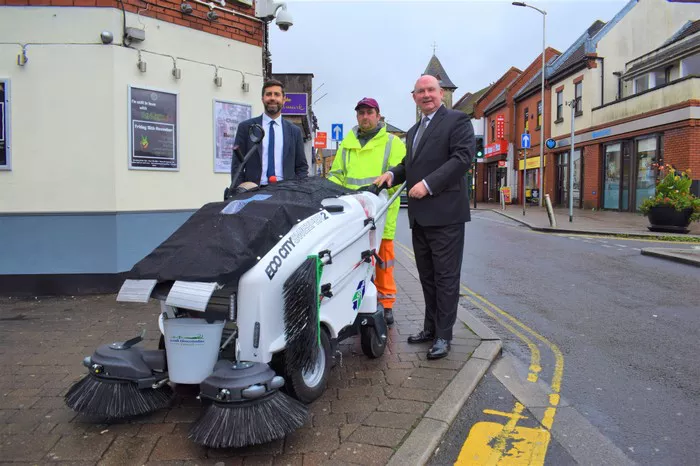Until early 2024, Napa County lacked protected bikeways despite long-standing advocacy by the Napa County Bicycle Coalition (NCBC). Maintenance challenges and the $200,000 cost for a specialized street sweeper had stalled progress on these projects. Although local officials recognized the need for safer cycling infrastructure, the financial barrier to acquiring a dedicated sweeper was significant.
The situation took a turn in January when Caltrans resurfaced West Imola Avenue (SR 121), a crucial east-west route in Napa. The resurfacing project introduced new flex post barriers to enhance existing painted bike lanes. While this upgrade significantly improved bike safety, maintaining clean bike lanes is essential to ensuring a comfortable and secure riding environment. Debris such as glass, gravel, and dirt in bike lanes can force cyclists into traffic lanes, heightening collision risks. Traditional street sweepers, however, cannot access protected bike lanes, putting the new infrastructure at risk of being dismantled.
In response to this challenge, the Napa County Bicycle Coalition stepped up. They proposed adopting and maintaining the protected bikeways on West Imola Avenue, leading Caltrans to modify its Adopt-A-Highway program to accommodate the bike facility. Unable to afford a $200,000 motorized sweeper, NCBC turned to an innovative solution designed by California inventor Pierre Lermant.
The new sweeper, a battery-powered device that attaches to the rear of a bicycle via a Burley bike trailer-style hitch, offers an efficient and cost-effective alternative. At just $4,500, the sweeper is a fraction of the cost of traditional equipment. This approach aligns with Lermant’s vision: “Regular cleaning is often overlooked in protected bike lane budgets,” he explains. “The Napa Valley initiative shows how Eco Sweeper devices can address budget constraints while engaging the community in maintaining clean bike lanes.”
NCBC launched a GoFundMe campaign on May 21, 2024, to fund the purchase of the sweeper. With contributions from 50 donors, including a major donation from coalition member Bill Tuikka, the campaign reached its $4,500 goal within a single day.
The sweeper’s first operation on June 17, 2024, proved successful, collecting nearly 36 gallons of debris—a substantial amount for such a compact, bicycle-pulled device.
Kara Vernor, Executive Director of the Napa County Bicycle Coalition, expressed gratitude towards Caltrans for their collaboration. “The adaptation of the Adopt-A-Highway program was crucial for maintaining Napa County’s first protected bike lanes on our high-injury network. Preventing the removal of these lanes was essential for enhancing safety.”
The bicycle-pulled sweeper not only provides a practical solution for Napa but also serves as a model for other cities to follow. By adopting and promoting innovative solutions, Napa County is setting a new standard for urban planning and public safety, paving the way for a safer, more bike-friendly future.

